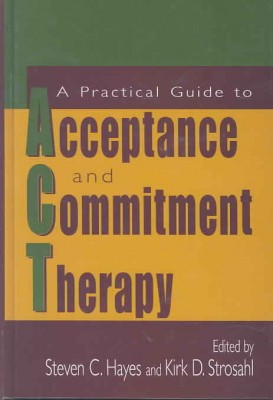| A Practical Guide to Acceptance and Commitment Therapy 2004 Edition Contributor(s): Hayes, Steven C. (Editor), Strosahl, Kirk D. (Editor) |
|
 |
ISBN: 0387233679 ISBN-13: 9780387233673 Publisher: Springer OUR PRICE: $170.99 Product Type: Hardcover - Other Formats Published: December 2004 Annotation: "ACT opened the door to more fascinating discoveries about human beings, language, and psychopathology in general. Within these discoveries also lie the treatment technologies comprising ACT that are competently presented in this book, A Practical Guide to Acceptance and Commitment Therapy. . .As the authors describe, this book is the first practical guide that highlights the ACT approach for numerous disorders and presents it in detail. . .The innovative conceptualization of psychopathology, presented in ACT, may appeal to practioners because it provides answers and alternatives to relapse and the difficulties some clients present with being unable to gain control of their symptoms. Practioners may also like the technology and the metaphors used in ACT. . .In each chapter presenting ACT for a different group of disorders, the authors skillfully present a formulation of the disorder based on the ACT principles and then describe the ACT approach for the specific disorder or group of disorders. . ." By Maria Karekla & Marianna Charilaou, PsycCRITIQUES, American Psychological Association, Volume 50, Number 52. |
| Additional Information |
| BISAC Categories: - Psychology | Clinical Psychology - Psychology | Industrial & Organizational Psychology - Psychology | Mental Health |
| Dewey: 616.891 |
| LCCN: 2004051660 |
| Physical Information: 1.23" H x 6.12" W x 8.8" (1.79 lbs) 396 pages |
| Descriptions, Reviews, Etc. |
| Publisher Description: This book is the most practical clinical guide on Acceptance and Commit- ment Therapy (ACT said as one word, not as initials) yet available. It is designed to show how the ACT model and techniques apply to various disorders, settings, and delivery options. The authors of these chapters are experts in applying ACT in these various areas, and it is intriguing how the same core principles of ACT are given a nip here and a tuck there to fit it to so many issues. The purpose of this book, in part, is to emboldened researchers and clinicians to begin to apply ACT wherever it seems to fit. The chapters in the book demonstrate that ACT may be a useful treat- ment approach for a very wide range of clinical problems. Already there are controlled data in many of these areas, and soon that database will be much larger. The theory underlying ACT (Relational Frame Theory or "RFT"-and yes, here you say the initials) makes a powerful claim: psy- chopathology is, to a significant degree, built into human language. Fur- ther, it suggests ways to diminish destructive language-based functions and ways of augmenting helpful ones. To the extent that this model is cor- rect, ACT should apply to a very wide variety of behavioral issues because of the centrality of language and cognition in human functioning. |